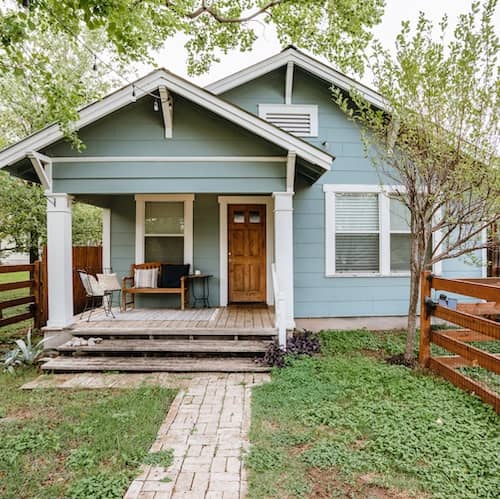What are the FHA loan down payment requirements?
Contributed by Sarah Henseler
Sep 2, 2025
•6-minute read

As of November 16, 2025, both Fannie Mae and Freddie Mac no longer have a minimum credit score threshold in their conventional loan eligibility guidelines. Loan approval will instead be based on an evaluation of overall credit risk factors.
Let’s walk through the FHA down payment requirements, what affects the amount you’ll need, and additional costs to consider.
How can buyers get approved for an FHA loan?
Your credit score plays a major role in how much you’ll need for your down payment on an FHA loan. The higher your score, the lower your required down payment.
If your credit score falls between 500 and 579, the minimum down payment is 10%.
If your credit score is 580 or higher, you may qualify with as little as 3.5% down.
For example: For an FHA loan on a $250,000 home, a credit score of 580 or higher could qualify you with as little as $8,750 down. That’s the minimum 3.5% down payment. But if your score is between 500 and 579, you’d need at least $25,000 down – the minimum 10%.
Additional FHA loan requirements
In addition to the down payment and credit score, there are a few other requirements you’ll need to meet in order to qualify for an FHA loan.
- Debt-to-income ratio (DTI): This compares your monthly debt payments to your monthly income. Your DTI should not exceed 43% of your monthly gross income, but you may qualify for a higher DTI with a higher credit score.
- Primary residence: The home must be your primary residence, meaning you must live in it full-time. You can’t use an FHA loan to buy a vacation home or investment property.
- Specific location: FHA loans can only be used to purchase properties located within the U.S. and its territories.
- Mortgage insurance premium (MIP): FHA loans require mortgage insurance, which protects the lender in case of default. This includes both an upfront premium – usually 1.75% of the loan – and annual premiums paid monthly.
Requirements may vary by lender, so be sure to check the specific requirements tied to the loan application.
Can you finance your down payment on an FHA loan?
No, you cannot finance your FHA down payment. It must be paid up front at closing and is considered part of your required cash to close.
Cash to close includes your down payment, along with other costs like closing fees and prepaid expenses. This is the total amount you’ll need to bring to the closing table when it’s time to finalize your home purchase.
Why is the FHA loan down payment requirement more flexible than other loans?
The FHA makes it easier for many buyers to meet the down payment requirement by allowing lower credit scores and even gift funds to help cover the down payment and other purchase-related expenses.
FHA gift rules
If you’re planning to use FHA gift funds for your down payment, you’ll need to understand how the rules work. The FHA allows you to use gift money to cover your down payment and closing costs, provided it comes from approved sources. This includes:
- A borrower’s family member
- A borrower’s employer or labor union
- A close friend with a clearly defined interest in the borrower
- A charitable organization
- A governmental agency assisting low/moderate-income families or first-time home buyers
However, people who have a financial interest in the home purchase can’t contribute gift funds toward your down payment, such as:
- The seller of the property
- Real estate agents
- The lender
- The home builder
Borrowers may also need to submit a gift letter to verify the source of the funds and confirm that the money doesn’t need to be repaid.
Lower credit score requirement
One of the biggest advantages of FHA versus conventional loans is the lower credit score requirement. While many conventional loans require a score of 620 or higher, FHA loans may be available to borrowers with scores as low as 500, though a score of 580 or higher is needed to qualify for the minimum 3.5% down payment. This makes FHA loans a stronger option for buyers who are building or repairing their credit.
Additional costs to close on an FHA loan
Closing costs
In addition to your down payment, you’ll need to cover FHA loan closing costs, which range from 3% to 6% of the home’s purchase price. These costs can include things such as loan origination fees, appraisal fees, title insurance, and prepaid expenses like homeowners insurance and property taxes.
For a $250,000 home, that means you could expect to pay between $7,500 and $15,000 in closing costs, depending on the lender.
But there’s good news. Sellers can contribute up to 6% of the home’s sale price toward your closing costs. This can help reduce your upfront costs or even allow you to put down a larger amount toward your down payment.
An up-front mortgage insurance premium
FHA loans require an up-front mortgage insurance premium (UFMIP) of 1.75% of the loan amount. This is a one-time fee that helps protect the lender and is required regardless of your down payment amount.
For a $250,000 home, the UFMIP would be $4,375. You can either pay this amount at closing or choose to roll it into your loan balance. Bear in mind that this will increase your total amount you borrow but reduce your out-of-pocket costs up front.
An annual mortgage insurance premium
Your annual MIP amount varies based on the terms of your FHA loan, loan-to-value ratio (LTV), and down payment. While it’s called an annual amount, it’s actually divided into monthly installments and added to your regular mortgage payment. This means your MIP is part of your monthly housing costs and helps insure that loan in case of default.
Is down payment assistance available for FHA loans?
Yes, many first-time buyers using an FHA loan can qualify for FHA down payment assistance through local or state programs. These programs are designed to help cover part (or all) of your down payment through grants, low-interest loans, or matched savings plans. Availability and eligibility can vary depending on location, income, and whether you meet the criteria for first-time buyers.
To make the search easier, the U.S. Department of Housing and Urban Development (HUD) offers an online resource that lists local home buying programs by state. You can use this tool to find programs in your area that may help with down payment or closing cost assistance.
Other low down payment mortgage options
FHA loans aren’t the only way to buy a home with a smaller up-front investment. Several other programs offer low, or even zero, down payment options, depending on your income, location, or military service. If you’re exploring how to buy a house with no money down, these may be worth a close look.
- Department of Veterans Affairs (VA) loans: VA loans are available to eligible veterans, active-duty service members, and some surviving spouses. There’s no down payment requirement for VA loans.
- U.S. Department of Agriculture (USDA) loans: USDA loans are available in qualifying rural and suburban areas and offer a 0% down payment. Note: Rocket Mortgage® no longer accepts USDA loan applications.
- Freddie Mac’s Home Possible®: This conventional loan program allows down payments as low as 3% and is designed for low- to moderate-income borrowers.
- Fannie Mae’s HomeReady®: This program offers 3% down options and allows income from non-borrower household members to help you qualify.
FAQ
Below are some of the most frequently asked questions about the FHA down payment requirement. If you want to learn more and narrow down your loan options, don’t forget to check out Rocket Mortgage learning resources.
How much is 3.5% down on a $300K house?
A 3.5% down payment on a $300,000 house is $10,500.
Who pays for the closing costs on an FHA loan?
The buyer typically pays closing costs, but the seller can contribute up to 6% of the sale price toward these costs. Sellers may consider contributing for reasons such as attracting more buyer offers over other homes for sale and speeding up the buying process.
The bottom line: FHA loan down payments are more affordable
FHA loans offer one of the most accessible paths to homeownership, especially if you’re working with a lower credit score or limited savings. Depending on your score, your minimum down payment could be as low as 3.5% or as high as 10%. Borrowers also have access to more flexible guidelines and may qualify for down payment assistance through local or state programs.
Want to explore whether it’s the right fit for you? Learn more about how to apply for an FHA loan with Rocket Mortgage.

Josephine Nesbit
Josephine Nesbit is a full-time freelance writer specializing in real estate, mortgages, and personal finance. Her work has been featured in U.S. News & World Report, GoBankingRates, Homes.com, Fox Business, USA Today Homefront, and other publications where she helps readers navigate the housing market and manage personal finances.
Related resources
5-minute read
How to get preapproved for an FHA loan
Explore how you can get preapproved for an FHA loan, what you’ll need to qualify and how the preapproval process works for this type of loan.
Read more
3-minute read
What is an FHA jumbo loan and should you get one?
An FHA jumbo loan lets you borrow a higher loan amount and make a lower down payment. Check out our guide to FHA jumbo loan limits and requirements.
Read more

5-minute read
FHA nonoccupant co-borrowers: Guidelines and how they can help
Nonoccupant co-borrowers can make a big difference in the qualifying process for an FHA loan. Learn the requirements for using this process effectively.
Read more